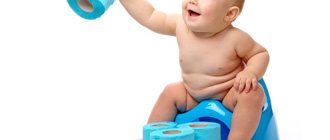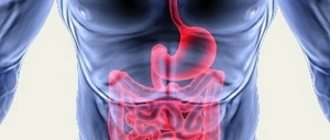Constipation after childbirth is not a rare occurrence; many women experience it. If there is no bowel movement for more than 48 hours, it is called constipation. In the postpartum period, the body needs time to recover, this also applies to intestinal function. When a woman does not go to the toilet for more than three days, she experiences abdominal pain and nausea, as well as other unpleasant symptoms. The development of constipation can be contributed to by poor diet, medications and other factors. It is worth talking in more detail about what groups constipation is divided into, and how to avoid this problem.
Main symptoms
When pregnancy occurs, the first signs of this situation are difficult to confuse. This is a joyful event for the family, but when the baby arrives, the mother may encounter problems with her intestines. During breastfeeding, you should carefully monitor your health and, if necessary, consult a doctor.
There are a number of symptoms that indicate long-term constipation that requires treatment:
- defecation occurs in small portions and with difficulty;
- a woman does not visit the toilet at all for two or more days;
- attacks of pain occur in the left part of the peritoneum;
- Nausea may occur and heaviness may also be felt;
- a woman experiences an unpleasant belch;
- there is a feeling of fullness in the intestines;
- the mother becomes irritable, apathy occurs;
- cracks appear in the anus and discomfort is felt;
- flatulence may occur;
- Night sleep disturbance is often observed;
- no appetite;
- when trying to defecate, you must push;
- bloating occurs.
In case of constipation, all symptoms do not need to be present. If such symptoms appear, it is necessary to take measures to solve this problem. Since the mother is breastfeeding, she should use only safe treatment methods; it is better to seek help from a specialist. But before you go to the doctor, you should think about your diet. If a woman often skips meals, or prefers to eat in large portions, this will certainly affect her digestion.
We recommend reading: No-spa for breastfeeding
Epidural anesthesia
Epidural anesthesia is used for both natural childbirth and caesarean section. By and large, it does not affect intestinal function in any way. But sometimes mild intestinal atony is possible due to the effects of the administered anesthetic drug: peristalsis worsens, the intestines become sluggish, food passes with difficulty.
Speaking about the timing of restoration of intestinal function, it is difficult to predict anything, since this is an individual process. But still, on average, within 7-10 days the young mother’s body recovers. In general, as soon as a woman starts eating something, the intestines activate their functions.
It is worth remembering that in addition to constipation, intestinal problems such as diarrhea or disruption of intestinal microflora are extremely rare, but still occur. Diarrhea, that is, diarrhea, loose stools, occurs only when a woman overdoes it with “relaxing” foods. It's easy to prevent this: stick to a postpartum diet.
The microflora may be disrupted if the woman in labor has undergone cleansing enemas. Such a process of cleansing the intestines is still not natural. To bring everything back to normal and prevent dysbiosis, the doctor will prescribe drugs with bifidobacteria that normalize intestinal function.
Causes of constipation in nursing mothers
The factors that cause constipation may vary, but the problem never just arises. A situation with delayed bowel movements can develop due to poor nutrition or severe stress. There are internal and external factors that lead to constipation:
- Episiotomy. This procedure is performed during labor. The situation becomes more complicated if the woman has previously had a perineal incision.
- Pain that does not go away for a long time after a cesarean section.
- The cause of constipation may be hidden in hemorrhoids that arose after the birth of the baby.
- Fatigue and weakness. Many women experience exhaustion because the mother cannot get enough sleep. In this case, the body weakens and bowel movements occur rarely.
- Fear of pushing. This is a psychological problem that can only be solved with a psychologist.
- Emotional stress. For every woman, the birth of a child is associated with serious experiences, which affects the functioning of the rectum.
- Dehydration. A very common cause of constipation during breastfeeding. The essence of the problem is that the woman drinks little fluid.
- Changes in hormonal levels. After the baby is born, the body begins to rebuild again, and the amount of hormones changes, which affects the digestive system.
Problems that can cause delayed or absent bowel movements have been described here. Most of these factors can be eliminated without the help of a specialist.
Types of constipation
In medicine, there are two main factors that lead to problems with stool in a nursing mother:
- Spasmodic constipation. This is a psychological problem, it often occurs in women who have given birth. The process of relieving oneself is made more difficult by the fact that the nursing mother compresses the sphincter, as she is afraid of the sutures coming apart or pain.
- Atonic constipation. If during childbirth the patient required a cesarean section, the sensitivity of the nerves will be impaired, which provokes the development of constipation. Also, taking antibiotics and painkillers has a bad effect on the functioning of the rectum.
We recommend reading: Menstruation after cesarean: when does it start, what kind and how long does it last, what should you be wary of?
What physiological changes occur in the body of the expectant mother?
If you look at a pregnant woman in profile, you will notice that the spine begins to bend in order to redistribute the load: the lumbar and cervical regions go forward, the thoracic region goes back. The uterus grows and strives upward. The sacrum also tends to follow it. The muscles of the back of the legs and back become static - after all, they are the ones who need to keep the body from possible falls. The entire body begins to rebuild around the uterus, creating favorable conditions for the growth and development of the unborn baby. During labor, the following occurs: The tip of the sacrum deviates to accommodate the baby's head. For the pushing period, the vertebral curves should be smoothed out. In order to “push” properly, the expectant mother must take a special position: pull her knees to her stomach, press her chin to her chest. Those. the process of returning to the pre-pregnancy state begins already during childbirth.
Treatment of constipation during breastfeeding
Now it’s worth considering in more detail how to improve stool after childbirth during breastfeeding. Today you can find many products on sale that help get rid of the problem. Treatment of constipation in nursing should be carried out by a doctor, since the child may be allergic to the selected medications. Approved medications include:
- Lactulose. This product is compatible with lactation, and it does its job perfectly. The drug is sold in powder. The product has a stimulating effect, but the result will be visible only after two days.
- Phytomucil. This medicine is in powder form, it contains plantain seed extract, as well as plum fruits.
- Duphalac. A well-known and effective drug, it helps improve bowel movements during breastfeeding. The composition contains lactulose and water, the substance is not absorbed into the blood, and therefore does not penetrate into mother's milk. The action is that the product increases the contents of the intestines, thanks to water, thereby allowing the rectum to cleanse itself. In addition, the drug contains beneficial bacteria. But it is worth considering that Duphalac does not act immediately.
- Forlax. Another remedy that is diluted in water and taken orally. The main active ingredient is macrogol, which increases the amount of feces with the help of water. If the mother takes this remedy, she should drink at least 2 liters of water per day.
What you should not do if you are constipated is take senna leaf laxatives. Such drugs not only affect the functioning of the mother’s intestines, but also penetrate into the milk, thereby causing colic in the baby. You can only take medications for a certain period of time, as they can be addictive.
Retention of stool
Mothers worry not only about the appearance of the stool, but also about its frequency. How often should a baby “do things”? Normally, the baby walks several times a day, usually after feeding. However, for some children, the norm may be once a day, or even once every few days. Typically, such children have an anatomically weak anterior abdominal wall and intestinal motility. Such periodicity of stool can be considered normal if the baby still walks regularly, the stool is of normal consistency and, in general, the baby is cheerful and cheerful and does not suffer from colic. There's no need to worry. However, if your baby is allergic, then you need to do everything possible to ensure that he goes to the toilet at least once a day. Atopic dermatitis is much more severe if the baby does not have bowel movements often enough - consult a doctor about this issue.
Children also experience physiological stool retention between the ages of one and a half to five months. It is important to monitor the baby’s condition here. If he experiences discomfort, he should consult a doctor. Children can hold back stool for psychological reasons, just as adults sometimes cannot go to the toilet if they are nervous. There is no need to panic because of a one-time problem, but if the problem persists or recurs, consult a doctor.
However, babies experience not just “delays” of stool, but also real constipation. Constipation is called not only when the baby does not go to the toilet at all, but also when the stool is “pea-shaped”, dry, when bowel movements are difficult. What could be the reason?
Regular constipation is usually caused by improper feeding of the baby. However, this condition can also occur if the mother is doing everything right, but she has her own health problems, for example, with the thyroid gland. Constipation can also be caused by medications. For example, intestinal weakness is provoked by all sorts of sedative mixtures and medications, which are often prescribed to children by neurologists at an early age. Even cough medicines or dental gels can cause constipation. In any case, a doctor should sort this out. You should not give your baby medications and laxatives on your own, or influence him mechanically with an enema or a gas tube. It is better to discuss with your doctor the issues of feeding, drug treatment and the baby’s lifestyle - this way you can understand the problem.
Folk remedies for constipation after childbirth
There are many infusions and decoctions that help cope with the problem, as well as improve lactation. It is worth talking about the most effective and safe laxatives prepared according to folk recipes:
- From gooseberries. You will need a tablespoon of ripe berries, place them in a glass and pour boiling water over them for ten minutes. The finished tincture is filtered and then taken a quarter glass each day. You can add chopped dried fruits to the drink.
- Figs with milk. To prepare the product, take a couple of spoons of figs and pour a glass of hot milk. Leave the product until it cools, and then take a tablespoon four times a day. If there is no milk, warm water is used, but in the first case the drink will be more effective and tasty. When breastfeeding, figs are safe and will not harm the baby. In addition, the product will saturate the woman’s body with useful components, and breast milk will contain all the necessary vitamins and minerals.
- Anise, fennel and thyme. In small quantities, fennel fruits will not harm the child, but will help get rid of problems with stool. Take three spoons of each plant and pour boiling water over it. Take a third of a glass three times a day.
We recommend reading: Detralex during breastfeeding: is it possible or not?
A few words about our clinic
There is little that can surprise a modern person. Perhaps only excellent health. After all, everything depends on him: quality of life, family relationships, financial situation, etc.
The main goal of our “Quality of Life” clinic is to improve the patient’s quality of life, to give the opportunity to enjoy every day that comes, this is especially necessary for young mothers.
Children are the most important thing in the lives of many families. And women sometimes take unnecessary risks to have a baby. In almost 100% of cases, pregnancy leaves its mark on the life and health of the mother. That's why we strive to help you recover properly so that you can enjoy motherhood calmly and worry-free. A healthy mother means a happy baby. Restoring your figure after childbirth is certainly important, but not right away. But don’t waste time in fitness clubs, don’t exhaust yourself with hours of training, don’t put yourself on a strict diet in order to quickly get into your prenatal size, don’t look at yourself in the mirror with a dejected expression on your face, but don’t give up on yourself either. You are MOM! And now you are EVERYTHING for your baby. YOU are an example! It is YOU who bears all the responsibility and daily hassles. If pelvic pain and other pain syndromes appear, do not tolerate it. At the “Quality of Life” restorative medicine clinic, professional osteopaths and rehabilitation specialists are always ready to help you. Enjoy every day, give yourself and your body time to recover, and the results will not be long in coming.
Similar articles:
- Directions
- Specialists
- For visitors
- Articles and videos
ONLY UNTIL January 31st!
20% DISCOUNT ON CLASSES ON THE REDCORD SUSPENSION SYSTEM
Classes are conducted by instructor-methodologist Osipova Maria.
REDCORD allows you to eliminate muscle imbalance by relaxing some muscles and stimulating others. This allows you to resume the motor pattern and return the patient to normal functioning!
Prevention and diet
Nutrition affects the development of the child, so a woman should eat different foods. There is a list of ingredients that will be helpful for severe constipation. For example, the diet should contain bran, fermented milk products, as well as vegetables and fruits, oatmeal, beets and pumpkin, apples and apricots. You can additionally prepare compotes from dried fruits. Proper nutrition for the mother is very important for the health of the child.
After reading the article, you can understand that treating constipation is very important. But it’s even better to prevent it, because a healthy diet prevents the development of digestive problems. Also, a nursing mother should drink more and rest more often.
What else can you do?
Physical activity can begin as early as the 3rd month after birth. But in order to create a good outflow of venous blood from the pelvic cavity, and prevent the abdominal press and pelvic diaphragm from weakening, the “vacuum” exercise will be the best help. Perform while lying on your back with bent legs: 1. Take a deep breath through your nose. 2. Exhale actively through your mouth, emptying your lungs. 3. Extend your ribs outward, allowing your belly to tuck under your ribs. Don't tense your abdominal muscles! Hold for 5-10 seconds. 4. Relax and breathe calmly.
It is recommended to visit an osteopath even for preventive purposes during the recovery period: to check the condition of bones, muscles, and ligaments. A pleasant bonus of this treatment is that osteopaths are able to erase the “memory” of the anesthesia from the body.








